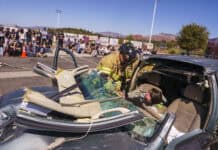Facing a business-killing hammer held above their heads by first-term Sedona Mayor Scott Jablow, four of Sedona’s OHV companies drafted a goodwill agreement to forestall his proposed OHV ban.
Goldwater Institute lawyers smacked down Jablow’s draft ordinance and all three of our state lawmakers said it was “not a valid exercise” of the city’s power that “conflicts” with several state laws, making the ordinance dead on arrival.
Undaunted by law and reason, Jablow said his cudgel was about safety and sent us a guest perspective in June that extensively addressed OHV safety, writing, “I believe that I should do all that I can to protect the health, safety and welfare of our residents.”
He then reiterated at length that OHVs — previously safe everywhere else in America — are too deadly and dangerous for Sedona’s roads.

The climax of his letter bemoaned, “Do we want to wait until there are more accidents or deaths?” In the name of Holy Safety, his legal brick would impose a tire requirement to save lives, a requirement that was technically and legally impossible for owners to comply with and that would thus effectively ban OHVs.
Yet the agreement with OHV rental company owners in lieu of his Ordinance of Salvation from these four-wheeled deathtraps lacks any reference to such safety elements, i.e., the “airbags, stability control, crumple zones, rear bumpers and DOT-approved tires.”
So it’s not vital to save lives of Sedona residents and our beloved visitors?
Maybe Jablow intentionally misled the public and his fellow council members — that’s not for us to say — to obscure that the real goal of his ban had nothing to do with safety but was instead an effort to coerce the USFS into adopting a permitting system in a wildly inefficient way.
Or perhaps it was really all political, and abandoning safety for a permitting system scheme that will take years to implement will fool enough voters into thinking that it was a “real” goal to get them to overlook the crushing defeat of Jablow’s signature campaign promise.
Jablow also claimed at the Tuesday meeting, again, that this “contentious” issue — only made contentious by Jablow’s myopic obsession — was about safety.
We must commend Councilwoman Melissa Dunn for calling out Jablow’s hypocrisy. Maybe she didn’t get Jablow’s memo that this was not about safety but extorting businesses? She noted that the ordinance language has nothing to do with noise or cajoling OHV renters into limiting their numbers on USFS lands, although the new agreement focuses on mufflers and speed noise at length.
- A permit system to limit OHVs on Forest Road 525 — five miles outside city limits — isn’t about safety.
- Installing GPS units to track OHVs within city limits isn’t about safety.
- Placing colored flags so we know which OHV is from which company is cute, but not about safety.
- Installing turn signals is about safety, but only if Sedona police also cite the thousands of automobile drivers who don’t use them anyway.
Dunn’s strongest point was that safety went out the window and the city is trying to mandate municipal rules on federal lands outside its control. It’s vital to understand that Sedona’s jurisdiction ends at the city limits. The city has no right whatsoever to unilaterally limit access to federal public lands because local leaders deem some activity out there annoying.
Federal lands are funded by taxpayers and belong to every American from Maine to Guam, Alaska to Puerto Rico. A unilateral agreement with less than a handful of business owners facing an extortionary and existential threat to comply with Jablow’s hamfisted demand cannot limit the public’s access to their lands.
We must also applaud Dunn for grilling City Attorney Kurt Christianson, Jablow’s co-cospirator in the safety farce, with a series of demands to know if Sedona has a demonstrable problem with OHVs speeding, to which Christianson could only offer an anecdotal “we’ve seen OHVs speeding” “here and there …” providing zero data.
The commitment letter oddly targets Morgan Road only, placating the 20 or so homeowners who really matter to our mayor. Jablow even suggested that the city build a gate to turn a public road into a private one with your tax dollars, surprising even other council members.
No other neighborhood gets such special treatment.
Even after Dunn had called him out, Jablow again talked about noise, willfully ignoring that he misled Dunn and the council about safety. Jablow claimed that the law is not a hammer, but if the companies get out of line, his shillelagh will crash right down. Council can call this public blackmail by the more legally polite term “exaction,” but “if you don’t do this thing we want, we will destroy you and your business” is extortion plain and simple.
The only penalty for noncompliance with the proposed agreement is that council could decide to pass the OHV ban, the one that violates state law, which would trigger a lawsuit and an SB 1487 complaint, followed by an injunction and a swift defeat in court.
The council was right to table this “safety” ordinance indefinitely since it was never about safety. Jablow’s law lacks legal merit, serving only as a paper tiger the mayor can wield as a bludgeon in an attempt to ruin OHV companies with legal litigation if they don’t dance in his charade.



















